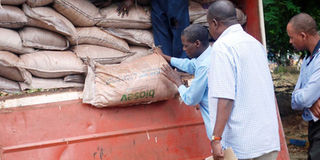Sugar importers set to face fresh vetting

An official from the Kenya sugar board oversees the offloading of one of the 400 bags of contra band sugar that was recovered in Shimoni, Kenya-Tanzania border, on June 5, 2013. According to the Kenya Sugar Board, current sugar importers and new applicants will be subjected to fresh vetting by the industry regulator, in a move aimed at curbing illegal sugar imports. PHOTO | LABAN WALLOGA
What you need to know:
- In a move aimed at curbing illegal sugar imports, current importers and new applicants must meet fresh requirements
- The importers will be required to submit latest audited accounts of their firms, PIN/VAT registration certificate, memorandum and articles of association, business permit, certificate of incorporation and tax compliant certificate
- Kenya Sugar Board director Mohammed Mukhwana welcomed the move, saying it would cushion local millers from unhealthy competition due to dumping
Registered sugar importers will be subjected to fresh vetting by the industry regulator.
In a move aimed at curbing illegal sugar imports, current importers and new applicants must meet fresh requirements.
Unlike in the past when importers could be registered anytime without going through thorough vetting, a public gazette notice by the regulator indicates that registration will be valid for one year.
The importers will be required to submit latest audited accounts of their firms, PIN/VAT registration certificate, memorandum and articles of association, business permit, certificate of incorporation and tax compliant certificate.
Others are certificate of good conduct of directors or partners of interested companies and forms A and E where applicable.
Kenya Sugar Board director Mohammed Mukhwana welcomed the move, saying it would cushion local millers from unhealthy competition due to dumping.
He said corruption that led to licensing of unqualified and brief case importers would be eliminated by the new rules.
“Unscrupulous importers have been shipping in more than 250,000 metric tonnes of sugar we require annually hence disrupting smooth operations of local millers that find it difficult selling locally produced sugar whose price is much higher due to exorbitant costs of production,” he said.
Mr Mukhwana said it would be possible to keep records of the importers and monitor their activities during the one year registration period easily since critical information about them will be available.
“The Ministry of Agriculture will no longer clear importers in secrecy as KSB will be fully involved in the vetting and other activities involved in clearing qualified firms and the entire importation process,” he said.
He continued: “The new framework will ensure industrial sugar does not find its way to shelves as has been the case,” explained Mukhwana.
Kenya National Sugarcane Farmers Association secretary general Simon Wesechere said: “Proper regulation rules will translate into good tidings for the farmers since millers will be able to sell sugar and pay farmers promptly and better.”




